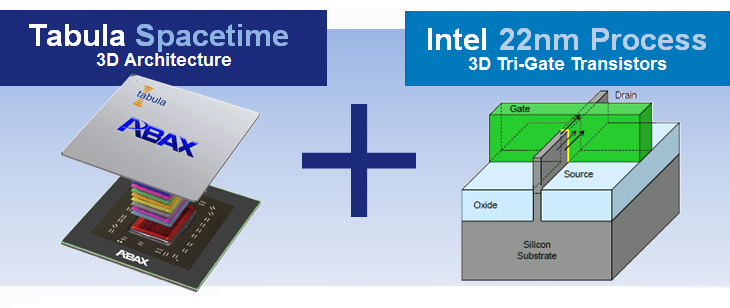Intel to Manufacture 22nm FPGAs for Tabula
Intel has sold 22 nm manufacturing capacity to Tabula.
The chip design company will use Intel's 3D Trigate manufacturing technology for its 3PLD FPGAs that target switches, routers, and packet inspection appliances. Tabula said that the 22 nm process combined with its Spacetime architecture will deliver "programmable circuits that consume significantly less chip area than circuits implemented with traditional FPGA fabrics." Tabula has contracted TSMC to produce its 40 nm Abax FPGAs.
Tabula is the second company that uses Intel as a foundry provider. In October of 2010, Achronix announced that Intel would build its FPGAs on 22 nm and beyond. According to media reports, Tabula has raised about $214 million in capital so far. The most recent round closed in May of 2011 with a volume of $108 million and was based on the promise that Intel would be building the chips for the company. The company employs more than 100 people and has more than 120 patents.
Tabula claims that its Spacetime architecture solves bottleneck problems in FPGAs and offers "dramatically shorter interconnects than traditional FPGAs and the ability to clock the entire fabric – logic, DSP, memory, and interconnect -- at the same frequency." The technology adds time multiplexing as a "third dimension" to the core feature of the chip and therefore enables the company to reduce the number of components and, as a result, the cost of the FPGA as well.
Get Tom's Hardware's best news and in-depth reviews, straight to your inbox.

Douglas Perry was a freelance writer for Tom's Hardware covering semiconductors, storage technology, quantum computing, and processor power delivery. He has authored several books and is currently an editor for The Oregonian/OregonLive.
-
blibba de5_royi know of certain fabless companies who could benefit from intel's foundries... ;DReply
Now that would be an interesting twist. I'd actually like to see Nvidia go to Intel as a foundry client, but nothing short of a merger could see that happen. -
Filiprino If NVIDIA was to use Intel's foundries, AMD would be screwed on both CPU and GPU camps. Uh... we would have a short period of enjoyment only to go into a deep dark era of high prices and frozen development.Reply -
blibba FiliprinoIf NVIDIA was to use Intel's foundries, AMD would be screwed on both CPU and GPU camps. Uh... we would have a short period of enjoyment only to go into a deep dark era of high prices and frozen development.Reply
You make a solid point. Let's have AMD remember how to make CPUs while we're at it, then. -
memadmax Didn't AMD have intel build their chips when they started out?Reply
I vaguely remember that, or was it IBM?
Anyways... Spacetime sounds cool, integrate it with highend cpus and ur good to go =D -
the_brute @ memadmaxReply
IBM wanted to make a cheap computer, and the research team used Intels 8086 vs IBMs offering. Intel got the contract with a condition. There were to be several companies to produce the chips. Most of the companies only lasted through the 286 era. AMD was always able to offer the same namesake chip with slightly more power than Intel, but they would always follow the Intel launch. The Intel 486 was the last chip that AMD coproduced with Intel. The next sets of processers were the first independent processors; Intel with Pentium (5xx) and AMD’s famous Athlon were the next development. It is only from this that AMD still has the right to produce Intel’s x86 instruction set. Their own extension AMD 386-364 is just an extension of the x86 but it also became a bargaining chip with Intel.
This is a brief and very rough history; I am saying this now before Im marked down.
-
CaedenV maxinexusCan not care less about switches, routers, and packet inspection appliances.good for you! I mean it's not like those types of things are integral parts of your computer, the internet, your car, your home network, your peripheral devices, your TV, your Cable, your cell phone, the flow of data that keeps our economy in tact, your ability to communicate with loved ones and business partners (and random people from other countries), your video games, etc. I mean, the advancement of this type of tech is just simply not important. :PReply

